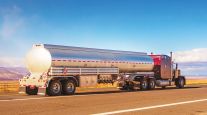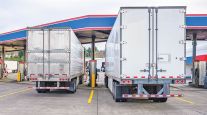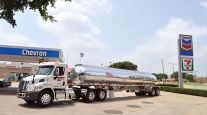Opinion: Don’t Waste Your Precious Profits
By Michael Buck
President
MCB Consulting
This Opinion piece appears in the March 14 print edition of Transport Topics. Click here to subscribe today.
Staggeringly high prices for fuel are with us again. The last time fuel prices were hovering in the neighborhood of $3.80 to $4.40 per gallon, many trucking companies fought back aggressively, using fuel conservation techniques and making sure drivers used the cheapest options available. However, for others it was just one more thing to put up with — with the help of fuel surcharges.
Many carriers climbed aboard the U.S. Environmental Protection Agency’s “SmartWay” bandwagon, which encourages companies to be fuel efficient while being good to the ecosystem. The problem with that is if a carrier lacks an “official” fuel conservation program, being “SmartWay” certified is almost a matter of “ready, shoot, aim” and doesn’t accomplish much beyond its public-relations value. You even can get an outside expert to fill out the documentation SmartWay requires, and many companies have taken that route.
I hasten to add that there’s nothing at all wrong with being SmartWay certified, or even outsourcing its paperwork. But the simple truth is even with SmartWay, your effect on the environment is negligible unless you are managing the one factor with a 30% to 35% effect on fuel economy — your drivers.
There is absolutely nothing available on the market, no whiz-bang technology that will have more effect on your fuel bills than simply holding your drivers accountable for the fuel they use — or, more to the point, waste.
It’s a simple fact that when drivers operate at higher speeds, fuel costs go up — and maintenance and tire costs increase proportionally as well.
What’s more, as transportation publications including Transport Topics have been reminding us in issue after issue, trucking company officials at the dawn of CSA — the Federal Motor Carrier Safety Administration’s Compliance, Safety, Accountability program — are now mandated to hold drivers accountable for safety.
If you are in a position that now requires you to keep a close eye on drivers, you should go the next step and put the “tools and rules” in place to make sure those drivers are accountable for fuel performance.
For example:
• Make sure your equipment performs to specifications and your preventive maintenance program keeps it that way.
• Establish a fuel procurement process that maximizes your full-procurement potential. Find out how what you’re paying compares with prices at the pump. Are your rebates not cutting it?
• Institute an equipment certification process that includes some type of notification on the equipment: e.g., a visible decal, sticker or notification on the driver’s vehicle inspection report book.
• Ensure that tire pressures are monitored on a regular basis, at no longer than 90-day intervals.
• Ask your engine or tractor manufacturer to provide a video you can use to train drivers to use the equipment properly. Make viewing those videos mandatory.
• Institute a driver performance program designed to make sure the people behind the wheel maximize fuel economy and equipment life. At the same time, compliment drivers on their positive efforts, and reward good performance and improved fuel economy.
• Be aware that electronic control module (ECM) data can be in error by as much as 12%. That’s a standard disclaimer by all engine manufacturers, the reason being that the fuel returned to the tank isn’t measured.
Finally, be aware of the following key factors that affect fuel economy, and understand that all of them are within the driver’s control:
• Driving skill.
• Decisions about speed.
• Tire pressure.
• Idling choices.
• Progressive shifting.
• Cruise control.
• Fifth-wheel position.
• Engine brake.
• Tractor and trailer alignment.
• Skip shifting.
• Staying at top governor speed.
• Air leaks.
• Brake adjustments.
• Dropping gears.
• Bug deflectors.
• Driving while upset or uncomfortable.
It’s clear that fuel prices are going to be waxing and waning at a much higher level for the foreseeable future. Deciding now on fuel-economy policies will help you to cope, no matter how high the prices soar. Some of you will do the usual and simply pass the fuel surcharge along to your customers. But for the sake of our economy, I hope increasing numbers will adopt fuel-economy programs and train drivers accordingly.
Technology is steadily accelerating the creation of products to increase fuel economy, some promising, but there’s no instant cure available yet. So before stocking up on these products, concentrate on getting your company’s fuel-economy policies in place and preparing your drivers and other personnel to take advantage of them. If you don’t, your return on investment will be negligible. EPA’s SmartWay is a good program, but without corresponding processes in place, it’s a classic exercise in futility.
MCB Consulting, Jacksonville, Fla., offers fleet maintenance advice and guidance.




